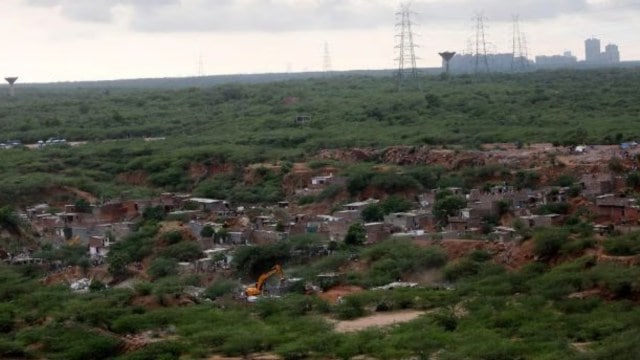Defending its plan to establish a safari park in the Aravallis, the government of Haryana has told the Supreme Court that the land for the proposed project has been “mined in the past” and is “highly degraded”, with “scrub vegetation” and a “crown cover” of less than 40% in most places.
“Instead of death knell, the project will be a conservation initiative for Aravallis as the area will be closed with a boundary wall (which at present is highly prone to encroachments and biotic interference)…,” the state said in an affidavit.

The affidavit was submitted in response to a plea filed by five retired senior Indian Forest Service officers and the environmental rights collective People for Aravallis challenging Haryana’s proposal to develop the curated jungle safari park in the ecologically sensitive Aravalli region.
Story continues below this ad
The petitioners have argued that the proposed project prioritises commercial interests over restoration of the region that is “Delhi-NCR’s only barrier against desertification, a critical water recharge zone, pollution sink, climate regulator and wildlife habitat”.
On October 8, a Bench of Chief Justice of India (CJI) B R Gavai and Justice K Vinod Chandran had paused work on the project until the next date of hearing.
In its response filed on Tuesday, the state said that the project, proposed by the Tourism Department, was initially planned over 10,000 acres, but the task has now been assigned to the Forest & Wildlife Department, which has “identified the most degraded area of 3,300 acres which is located in one corner out of the earlier proposed 10,000 acres and submitted the DPR (Detailed Project Report) to Central Zoo Authority (CZA)…for approval…”.
The proposed park “is not part of Compensatory Afforestation…” and “no funds of Compensatory Afforestation will be utilised” for its development, the state has said. It has said that “areas with good natural flora have been excluded”, and that gram panchayats of the seven villages whose land will be part of the proposed project “have no objection” and “are aware of the fact that the employment and other opportunities will be created for them once the project is implemented”.
Story continues below this ad
According to the affidavit, while the “Aravallis of Faridabad and some part of Gurugram and Asola Wildlife Sanctuary of Delhi are…contiguous”, the proposed safari area “has no continuity with that part of the block of Aravalli Hills”.
Also, the affidavit has claimed, the proposed park “has no commercial objective”, and “has no relation to real estate projects as the construction activities have been prohibited/ restricted in Aravallis due to various orders of the…Courts” and a central government notification of May 1992.
According to the Haryana government, “the corridor of naturally occurring wild animals will not be affected due to the enclosures made for safari animals”. The animals “will be taken from zoos or from other such areas as per CZA guidelines”, and the park “will be an open zoo…[whose] sole objective is education, research and awareness creation along with ecological restoration of the proposed area”.
Ruling out any adverse impact on groundwater, the affidavit has said that “ground water will not be depleted as a pipeline of Treated Waste Water of 3 MLD (million litres per day) has already been installed which is recharging the waterbodies in the proposed area and this water will be used for restoration activities”.
Story continues below this ad
The “eco-restoration…will include removal of invasive species and plantation with local species, soil moisture conservation activities, construction within permissible limits of CZA guidelines and Consolidated Guidelines of 2023 under Van (Sanrakshan Evam Samvardhan) Adhiniyam, 1980”, the affidavit has said.









